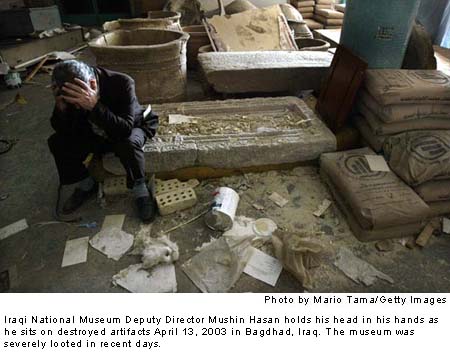The devastation of the great library in Alexandria during the Roman Empire is ranked as one of the foremost losses of knowledge from the ancient world. Thousands of volumes of materials that covered topics from art to science to literature went up in smoke as a result of Roman expansion into Egypt. According to the Latin scholar Livy, Julius Caesar torched the fleet of Cleopatra's brother, a rival monarch, and burned the library along with its collections in the process. To this day, little real knowledge exists on the exact holdings and even the precise description of this wonder of the ancient world. Two thousand years later, the most recent world power, the United States, must now assume responsibility for the loss of the museum and library during the recent Iraq War. Briefly, these collections documented the Babylonian, Sumerian, Assyrian, and Islamic civilizations - an estimated 170,000 artifacts in the museum. The collection contained objects dating back thousands of years and was worth billions of dollars in monetary terms. But to scholars and people throughout the world, the collection was literally priceless. In an era where two former Washington Post reporters receive millions of dollars for their notes on the downfall of one American president, the price in real dollars for the contents of this museum can never be calculated. Monetary value is hardly the measure of this loss. Not just the museum and its contents were destroyed. The National Library and the Iraq Historical Archives Building that housed books, archives and other irreplaceable written materials, was ransacked and left a smoldering shell. Ironically, the archive building was known as the "House of Wisdom." The building contained rare and one of a kind historical documents from ancient times to the twentieth century. Sadly, as reported by several news outlets, the United States forces stood by and watched this tragedy unfold before their very eyes. Many press accounts stated that Washington officials and the military received specific warnings about these and many other vital locations in Iraq. Apparently these sites failed to receive sufficient ranking on the scale used by planners. They certainly neglected these historic collections in favor of protecting oil fields and the oil ministry. General Richard Myers, chair of the Joint Chiefs of Staff, later stated that protection of the museum had been considered but combat operations received priority. And Defense Secretary Donald H. Rumsfeld in his widely publicized statements said the destruction was "the price of liberation." The Secretary blamed events on "the chaos that ensures when you go from a dictatorship to a new order...we didn't allow it. It happened and it's unfortunate." The Secretary is partially correct. It is unfortunate. It is unfortunate that a nation that supposedly treasures its own heritage and touts its own democratic evolution would have such callous disregard for that of another nation. This becomes particularly crucial when we hope that Iraq and other nations in the Middle East will move into the family of nations with a more representative style of government. This objective will be difficult in a region that has little experience in self-government and where human rights have often suffered under the heel of repressive regimes. Without the knowledge of the past, the record of achievement and failure, that task becomes even more daunting. As the National Council on History stated on these tragic events, the cultural heritage and material culture inherited from our ancestors is among humanity's greatest treasures and part of the irreplaceable wealth of humankind. Therefore, the responsibility belongs to all nations to preserve this heritage. This specifically applies to our nation as we attempt to impose our own vision on this part of the world that has experienced warfare and abuse for many generations. Our nation must acknowledge our responsibility in the senseless acts of vandalism and the willful destruction that took place at these irreplaceable institutions and archives. The world is watching our actions – and may view us as the next Rome in this new era of Pax Americana. © Patrick L. Cox, Ph.D.
|
|
|
Write a Letter
to the Editor |

 T
T